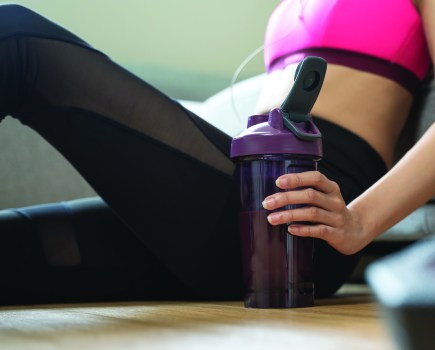Have you been drinking more since the pandemic started? Dr Juliet McGrattan looks at the drinking habits of the UK population and suggests how to cut back.
Multiple surveys during lockdown showed that people in the UK were drinking more alcohol due to stress, boredom and anxiety. While some people have cut back since lockdown restrictions have eased, others have found that their increased drinking has become a habit. What harm will it do us, how will it affect our exercise and how do we break the habit and cut back?
Lockdown drinking
The charity Alcohol Change UK found that over a quarter (28 per cent) of people who drink alcohol, drank more during the first lockdown. With the UK in the midst of another national lockdown, it would be easy for our intake to creep up.
With waistlines growing and increased awareness of the importance of a healthy lifestyle for maintaining good health, many people feel concerned about their lockdown drinking. Alcohol Change UK reported that one-third of people planned to take active steps to manage their drinking including having alcohol-free days, buying less alcohol and seeking support online or from their GP. They saw a 242 per cent rise in visits to their support and advice pages.
Two in three people anticipated drinking the same amount or more after the first lockdown, demonstrating that many will find their new habits hard to break. There are many steps you can take to begin reducing your alcohol intake and identifying the feelings and behaviours that trigger you pouring a drink is important in helping you cut down.
If you find that self-help measures aren’t working, you feel dependent on alcohol or it’s affecting your daily life, then it’s time to seek professional help. You can use Drinkchat, an online chat service or Drinkline, a confidential helpline (0300 123 1110).
How to reduce your alcohol intake
Here are some simple steps you can take to gently cut back your drinking and improve your health.
• Switch to low alcohol or alcohol-free drinks. There is a wide range of tasty alternatives such as low alcohol wine and lager and ‘clean gin’.
• Alternate your alcoholic drinks with soft drinks.
• Use a smaller glass. Switch your 250ml wine glass for a 125ml one and don’t fill it to the brim.
• If you’re drinking at home, pour your own drink. Be in control of how much is in your glass.
• Try to have two or more alcohol-free days each week.
• Distract yourself. Pouring a drink is often a habit. Do something different such as go out for a quick walk when you feel the urge to drink.
Alcohol and exercise
There are many myths about alcohol and exercise. Despite what you may have heard, it isn’t possible to sweat it out of your system. Alcohol is absorbed from the stomach and small intestine into the bloodstream. It’s metabolised in the liver by enzymes including alcohol dehydrogenase. The liver can clear about one unit of alcohol from your system per hour and any excess backs up in the blood and body tissues, waiting to get broken down. This means that if you don’t stop drinking until the early hours of the morning, you may still have alcohol circulating in your blood which can affect your training later in the day.
Alcohol, training and performance
Apart from a relaxing drink the night before a big race potentially helping sleep, the news is negative. Alcohol has a detrimental effect on performance. It causes dehydration and increases heart rate, putting you at increased risk of fast and abnormal heart rhythms such as atrial fibrillation. It reduces the amount of glucose available for muscles to use, lowering energy levels, strength and power. It affects sleep, concentration and co-ordination leaving you at higher risk of injury. Body temperature regulation is disturbed, and alcohol doesn’t have any nutritional value.
If you exercise regularly can you drink more alcohol?
While we know that drinking alcohol will cancel out many of the health benefits of exercise there is some suggestion that exercise may help protect against damage from alcohol.
Studies have mainly been carried out on rats. The indication is that regular exercise could prevent some of the declines in liver cell function caused by long term alcohol use. High activity levels might protect against some irreversible liver damage from alcohol. The exact mechanism is unclear but may be due to fewer liver cells dying early, resulting in less inflammation in the liver. Regular exercise may also speed up the liver’s metabolism of alcohol.
Don’t assume that this means if you exercise regularly you can drink as much as you want. This is still an area of research. The extent to which alcohol is protective may differ between rats and humans and will almost certainly vary between individuals.
Long-term alcohol intake
No level of drinking is guaranteed to be absolutely safe. The Chief Medical Officers’ Guidelines recommend how much we can consume while maintaining a low risk to our health.
Moderate drinking
Whether prolonged, moderate drinking is likely to be an issue, is a hard question to answer. Some studies have shown that people who drink a moderate amount of alcohol have a lower risk of heart disease compared to those who don’t drink. This was particularly true for women over the age of 55. A glass of red wine might potentially help to increase the good cholesterol in the blood and have a beneficial effect on blood vessels through its antioxidant power. However, exercising will increase good cholesterol more and antioxidants are just as easily acquired from eating grapes and berries. There is definitely not enough evidence to suggest non-drinkers begin to drink alcohol for health reasons.
We are all individuals and how our body responds to and metabolises alcohol varies. Generally, the more you drink, the larger the risk to your health. There is a fine line between healthy and unhealthy drinking and it’s clear that lifestyle changes will do more for our health than drinking moderate amounts of alcohol.
How much is too much?
How much alcohol can we drink and keep our risk of harm low? The Chief Medical Officers’ Guidelines are:
• Men and women should not drink more than 14 units of alcohol per week on a regular basis.
• If you regularly drink 14 units per week, spread your alcohol intake over at least three days.
• Pregnant women should abstain from drinking alcohol completely.







